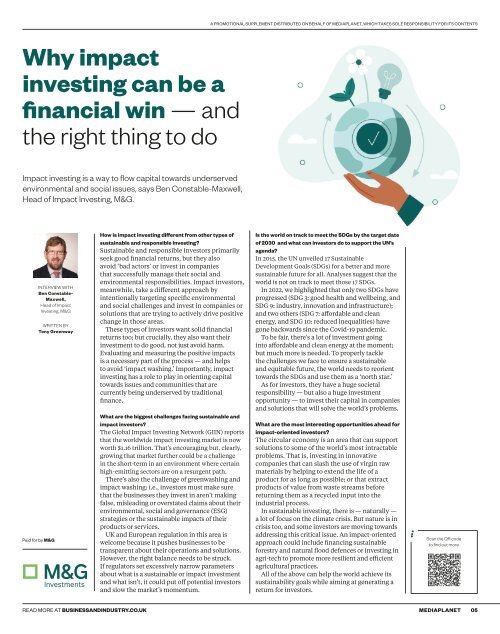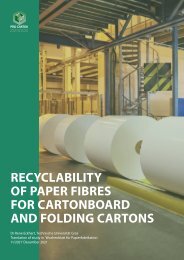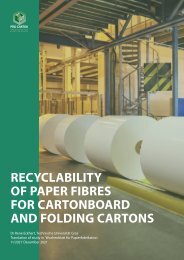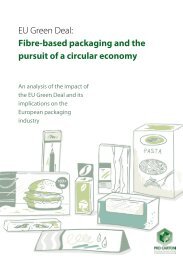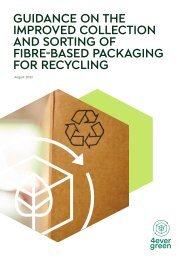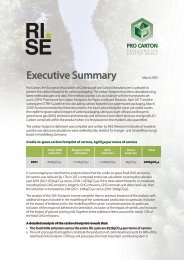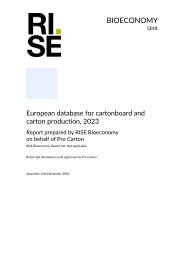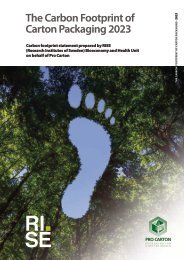2023 Sustainable Living Media Planet Supplement
Create successful ePaper yourself
Turn your PDF publications into a flip-book with our unique Google optimized e-Paper software.
A PROMOTIONAL SUPPLEMENT DISTRIBUTED ON BEHALF OF MEDIAPLANET, WHICH TAKES SOLE RESPONSIBILITY FOR ITS CONTENTS<br />
Why impact<br />
investing can be a<br />
financial win — and<br />
the right thing to do<br />
Impact investing is a way to flow capital towards underserved<br />
environmental and social issues, says Ben Constable-Maxwell,<br />
Head of Impact Investing, M&G.<br />
INTERVIEW WITH<br />
Ben Constable-<br />
Maxwell,<br />
Head of Impact<br />
Investing, M&G<br />
WRITTEN BY<br />
Tony Greenway<br />
Paid for by M&G<br />
How is impact investing different from other types of<br />
sustainable and responsible investing?<br />
<strong>Sustainable</strong> and responsible investors primarily<br />
seek good financial returns, but they also<br />
avoid ‘bad actors’ or invest in companies<br />
that successfully manage their social and<br />
environmental responsibilities. Impact investors,<br />
meanwhile, take a different approach by<br />
intentionally targeting specific environmental<br />
and social challenges and invest in companies or<br />
solutions that are trying to actively drive positive<br />
change in those areas.<br />
These types of investors want solid financial<br />
returns too; but crucially, they also want their<br />
investment to do good, not just avoid harm.<br />
Evaluating and measuring the positive impacts<br />
is a necessary part of the process — and helps<br />
to avoid ‘impact washing.’ Importantly, impact<br />
investing has a role to play in orienting capital<br />
towards issues and communities that are<br />
currently being underserved by traditional<br />
finance.<br />
What are the biggest challenges facing sustainable and<br />
impact investors?<br />
The Global Impact Investing Network (GIIN) reports<br />
that the worldwide impact investing market is now<br />
worth $1.16 trillion. That’s encouraging but, clearly,<br />
growing that market further could be a challenge<br />
in the short-term in an environment where certain<br />
high-emitting sectors are on a resurgent path.<br />
There’s also the challenge of greenwashing and<br />
impact washing: i.e., investors must make sure<br />
that the businesses they invest in aren’t making<br />
false, misleading or overstated claims about their<br />
environmental, social and governance (ESG)<br />
strategies or the sustainable impacts of their<br />
products or services.<br />
UK and European regulation in this area is<br />
welcome because it pushes businesses to be<br />
transparent about their operations and solutions.<br />
However, the right balance needs to be struck.<br />
If regulators set excessively narrow parameters<br />
about what is a sustainable or impact investment<br />
and what isn’t, it could put off potential investors<br />
and slow the market’s momentum.<br />
Is the world on track to meet the SDGs by the target date<br />
of 2030 and what can investors do to support the UN’s<br />
agenda?<br />
In 2015, the UN unveiled 17 <strong>Sustainable</strong><br />
Development Goals (SDGs) for a better and more<br />
sustainable future for all. Analyses suggest that the<br />
world is not on track to meet those 17 SDGs.<br />
In 2022, we highlighted that only two SDGs have<br />
progressed (SDG 3: good health and wellbeing, and<br />
SDG 9: industry, innovation and infrastructure);<br />
and two others (SDG 7: affordable and clean<br />
energy, and SDG 10: reduced inequalities) have<br />
gone backwards since the Covid-19 pandemic.<br />
To be fair, there’s a lot of investment going<br />
into affordable and clean energy at the moment;<br />
but much more is needed. To properly tackle<br />
the challenges we face to ensure a sustainable<br />
and equitable future, the world needs to reorient<br />
towards the SDGs and use them as a ‘north star.’<br />
As for investors, they have a huge societal<br />
responsibility — but also a huge investment<br />
opportunity — to invest their capital in companies<br />
and solutions that will solve the world’s problems.<br />
What are the most interesting opportunities ahead for<br />
impact-oriented investors?<br />
The circular economy is an area that can support<br />
solutions to some of the world’s most intractable<br />
problems. That is, investing in innovative<br />
companies that can slash the use of virgin raw<br />
materials by helping to extend the life of a<br />
product for as long as possible; or that extract<br />
products of value from waste streams before<br />
returning them as a recycled input into the<br />
industrial process.<br />
In sustainable investing, there is — naturally —<br />
a lot of focus on the climate crisis. But nature is in<br />
crisis too, and some investors are moving towards<br />
addressing this critical issue. An impact-oriented<br />
approach could include financing sustainable<br />
forestry and natural flood defences or investing in<br />
agri-tech to promote more resilient and efficient<br />
agricultural practices.<br />
All of the above can help the world achieve its<br />
sustainability goals while aiming at generating a<br />
return for investors.<br />
Scan the QR code<br />
to find out more<br />
READ MORE AT BUSINESSANDINDUSTRY.CO.UK MEDIAPLANET 05


